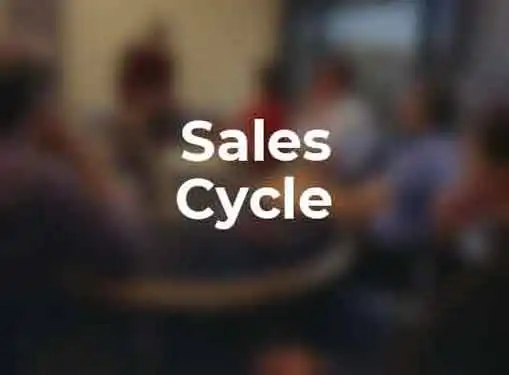Selling Advice
Sales Cycle
Written by Stefan Martinovic for Gaebler Ventures
How well do you understand your sales cycle? Recording the steps in your sales cycle is the first step to take in improving your sales.
A sales cycle consists of the time elapsed between customer initiation of the buying process and the point at which a final decision is made to purchase a product.

If your business is heavily reliant on the performance of salespeople to push the business forward, having an established sales cycle can serve to give sales numbers a boost.
Additionally, a sales cycle can make it easier for newly-hired salespeople to jump right in and experience success in sales, providing an immediate contribution to your business rather than undergo an extended "feeling-out" period where experience is derived from trial and error.
Many successful companies across many industries have been advocates of the sales cycle, as it has shown a proven track record of success for them.
Particularly in the insurance industry, corporations such as Northwestern Mutual teach new salespeople their sales method. This not only allows salespeople to become comfortable with the products, but gives them a proven method on which to attempt their initial sales. From there, once they have established a comfort level, salespeople are then taught to tailor certain steps within the cycle to fit their individual personalities to get the most from their abilities.
The first step in establishing a concrete sales cycle is to examine the steps taken by successful salespeople within your company or industry.
While you may be a new company, it is likely that if your business is driven by salespeople, that you have hired sales professionals experienced in your industry to help get your business established. By tapping into their wealth of knowledge, you can examine what tactics have worked for them in the past and adapt their strategies to fit your business.
All sales cycles typically include the steps qualification, presentation, proposal, negotiation, close, delivery, and evaluation.
- Qualification involves ensuring that a particular individual has the interest and means needed to become a potential customer.
- Presentation is the initial sales pitch detailing the benefits of the product or service being offered for sale.
- Proposal is the introduction of sales terms into the fold.
- Negotiation is the attempt to establish a mutual agreement of sales terms.
- Close is the finalization of the sale and end of business.
- Delivery is the receipt of the final product by the purchasing party
- Evaluation involves follow up with the customer and possible introduction to future sales leads.
While these steps are typical to a traditional sales cycle, these steps can be adapted to fit the needs of your business or to tap into talents possessed by your sales force. Once a particular cycle has proven itself successful to your company, cementing that cycle and setting it as the standard sales process can boost your sales numbers for the foreseeable future.
Stefan Martinovic has an extensive body of work across the financial services, manufacturing, and retail industries. He is currently pursuing an MBA in Management and Entrepreneurship at The College of William & Mary.
Share this article
Additional Resources for Entrepreneurs



Generally speaking, I would think goods or services that are high-cost, complex, mission-critical, or sold in a highly competitive space would tend to have longer sell cycles.